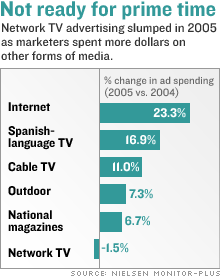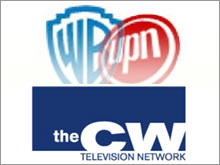|
To be on TV or not to be on TV
As the upfront ad buying period approaches, marketers and the broadcast networks debate whether 30-second commercials are still effective.
NEW YORK (CNNMoney.com) - Is the old-fashioned 30-second TV commercial destined to go the way of the dinosaur, the wooly mammoth and the dodo? More and more people are using digital video recorders (DVRs) to watch TV shows when they want -- and zoom past ads in the process. And advertisers have taken notice. According to a study conducted by the Association of National Advertisers and Forrester Research that was released this month, 78 percent of 133 national advertisers said they felt traditional advertising has become less effective during the past two years. What's more, nearly 70 percent of the marketers surveyed said they thought DVRs and video-on-demand services will "reduce or destroy" the usefulness of 30-second commercials. That's not good news for the major television networks, especially as they get set to haggle over advertising rates for the 2006-2007 television season in the coming months. This negotiating period, a rite of spring in TV land, is known as the "upfront," the time when marketers get sneak peaks at the next season's lineups and make a large portion of their advertising commitments. Last year, advertisers committed about $9.1 billion in commercial time during the upfront period, according to several media buyers. That was slightly higher than what they spent in 2004. DVRs, the Web and the CW weigh on advertisers
But this year, there are questions about whether advertisers will be willing to spend more. Technology is expected to be one of the main sticking points during the upfront negotiations. "Advertisers and the networks are aware of the accelerating pace of change, and that in order to remain valuable, let alone viable, the networks have to reflect the quickening pace of technology and incorporate it into their business model," said John Rash, senior vice president and director of broadcast negotiations with Campbell Mithun, a Minneapolis-based media buying firm. Others argue, however, that advertisers may be talking tough about the issue of DVRs and other technology but, at the end of the day, most marketers realize that to reach the broadest audience, network TV is the way to go. "Are advertisers seriously going to reallocate a lot of their money to podcasting, satellite radio and video on demand?" said Brad Adgate, senior vice president of corporate research for Horizon Media, a New York-based marketing firm. "The DVR issue is very interesting but the use of DVRs is still rather minimal so is it just posturing or will marketers come to loggerheads over this?" Still, the debate over DVRs is just one factor leading advertisers to question how much they need to spend on prime time television. Marketers also may be less enamored with network television simply because many consumers are flocking to alternative forms of entertainment. To that end, overall network TV ad spending declined in 2005, according to data from Nielsen Media Research. Meanwhile, advertisers spent significantly more on the Internet, Spanish language TV and cable. "Overall ad budgets may be getting larger but they are being spread over a wider array of platforms," said Bill Carroll, vice president and director of programming with Katz Television Group, a consulting and media buying firm in New York. Another wild card in this year's upfront is how the creation of two new TV networks targeted at viewers in the 18-34 year-old demographic, a market particularly lusted after by advertisers, will change the TV landscape. The CW, a network being created by the merger of CBS' (Research) UPN network and Time Warner's (Research) WB, will begin airing in September with top shows from both of those networks. (Time Warner also owns CNNMoney.com.) "This combined entity could be a force to be reckoned with. I believe that the UPN and WB are better together than apart," said Shari Anne Brill, vice president of programming with Carat USA, another media buying firm. In addition, News Corp.'s (Research) Fox is starting a mini-network called MyNetworkTV that will air on a mix of local stations that will be left without a network affiliate as a result of the WB-UPN merger. MyNetworkTV is launching in September with two youth-oriented soap operas that will air five nights a week for 13 straight weeks. This so-called "telenovela" format has been extremely successful for Univision (Research), the Spanish-language broadcast network that is up for sale. What's in store for the Big Four?
Looking at the other big four networks, media buyers say that advertisers will probably be faced with similar trends as last year. ABC, CBS and Fox, which are currently battling for the title as the most watched network among 18-49 year old viewers, should hold up well, while question marks remain at NBC. ABC appears to be in the driver's seat in terms of being able to negotiate the biggest ad rate increases, buyers said. During last spring's upfront, ABC reported a sizable jump in ad commitments, to approximately $2.1 billion. "Last year, ABC clearly set the pricing and they still have a lot of desirable shows that advertisers want. So they should be a key factor in where the market is going to go," said Adgate. One issue confronting ABC is what to do on Monday nights. "Monday Night Football" is moving to ESPN, the cable sports network, which like ABC, is owned by Walt Disney (Research). Carroll and Brill both said they would not be surprised if ABC switched its Sunday night hit "Grey's Anatomy" to Monday to try and shore up the void left by MNF. CBS is in a unique position since it already has announced that it is renewing 14 of its shows for next season. So there won't be as many new shows for the network to preview for buyers in May. "If advertisers are looking for stability, it's at CBS," Carroll said. Fox is expected to continue to be attractive to advertisers thanks largely to its runaway hit, "American Idol." The singing contest has surprised many by generating its strongest ratings yet this year, even though the show is in its fifth season. "Fox executives must do a novena every night to Simon Cowell," Caroll said, referring to the caustic British judge on "American Idol." And then there's NBC. The network has struggled again this year, despite having the Winter Olympics boost its ratings a bit in February. Last year, NBC posted a sizable decline in ad commitments. But media buyers said there is some hope for NBC heading into this spring's upfront. For one, NBC will be able to tout the return of pro football to its lineup. The network will air Sunday night games. Buyers also said they are optimistic about the chances for some new shows for the fall that NBC has talked about with advertisers and critics. In particular, Brill said that "The Black Donnellys," a crime drama created by Paul Haggis, the director of this year's Oscar-wining Best Picture "Crash," and "Studio 60," a show by "West Wing" creator Aaron Sorkin starring Matthew Perry of "Friends" look promising. Is CBS' March Madness on Demand the future of TV? Click here. TiVo is cool but the stock is not a good investment. Click here.
The reporter of this story owns shares of Time Warner through his company's 401(k) plan. |
|




